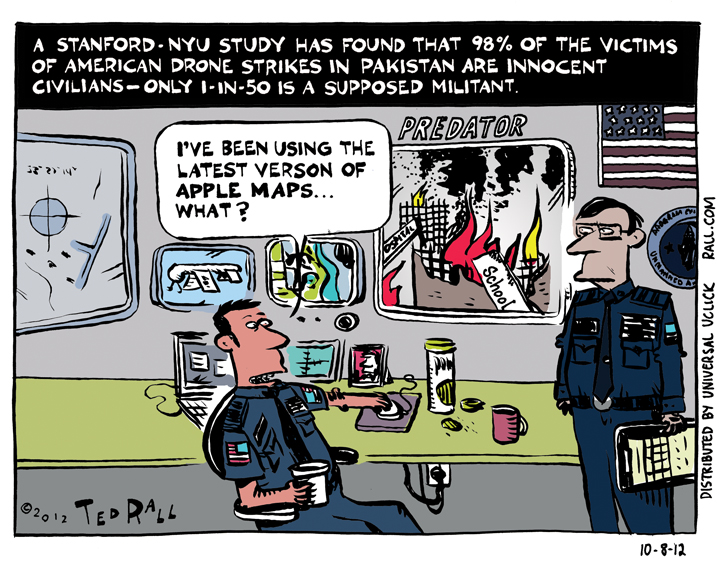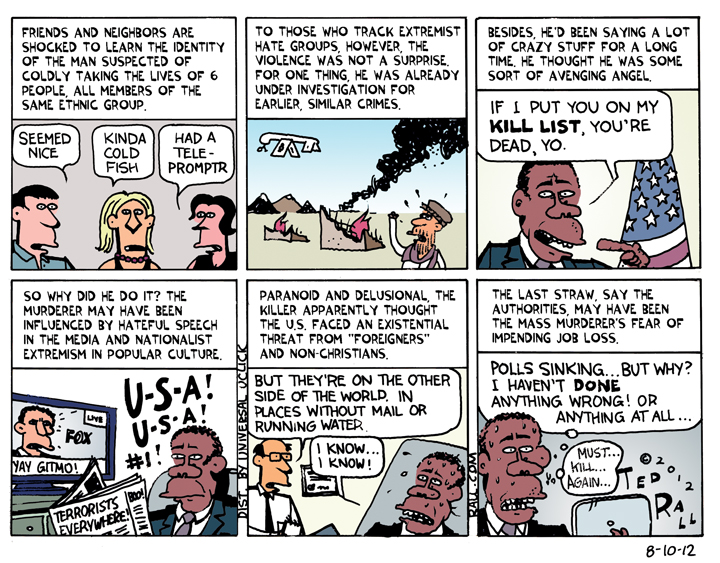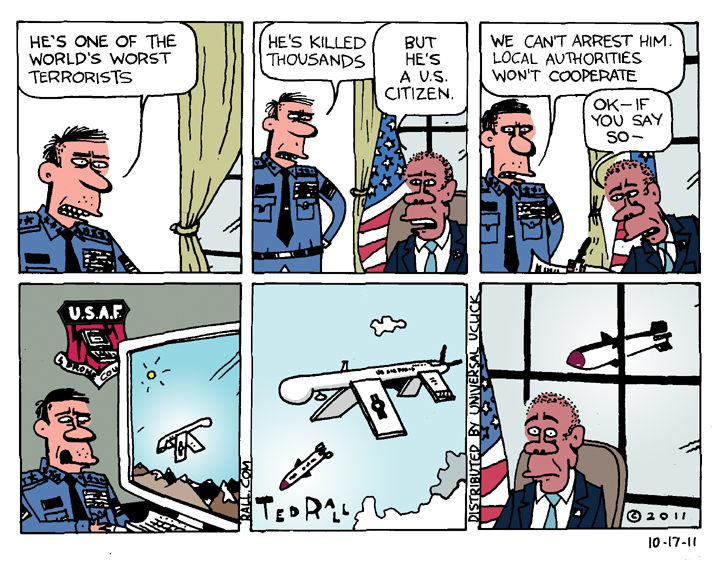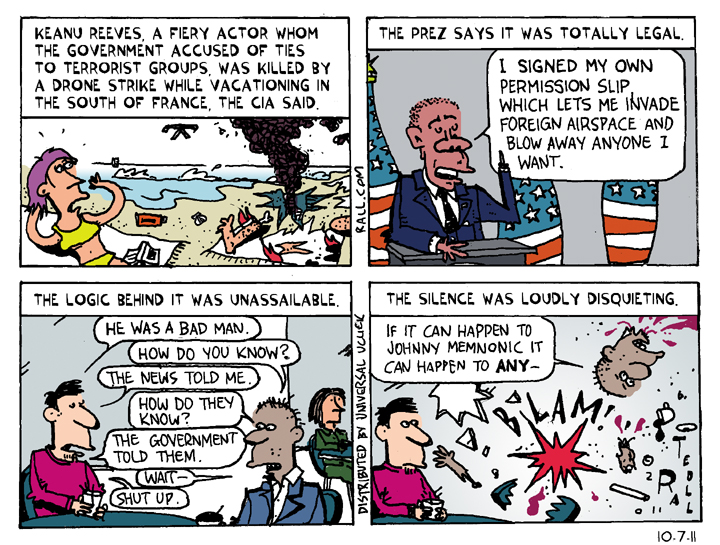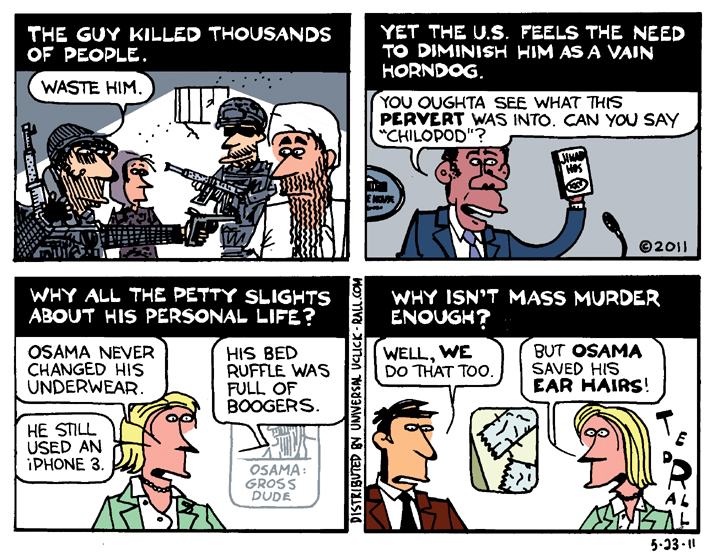Cannibals, Thoughtcrime and a Rising Police State
“I was going to be tied up by my feet and my throat slit and they would have fun watching the blood gush out of me because I was young,” the wife of 28-year-old NYPD “cannibal cop” Gilberto Valle testified at his trial.
After she installed keyboard-tracking software on his laptop, Kathleen Mangan-Valle went on, she found that her husband planned to stuff one of her friends in a suitcase and murder her. Two other women were “going to be raped in front of each other to heighten their fears,” while another would be roasted alive over an open fire.
Planned? Or fantasized?
There’s no evidence that Officer Valle, on trial for conspiracy to kidnap, torture, kill and eat women, ever acted on his voreaphilia, a cannibalism fetish. If convicted, however, he faces up to 20 years in prison.
George Orwell called it “thoughtcrime”: punishing people for their thoughts rather than their actions. The case of the cannibal cop – or, more accurately, the wannabe cannibal cop – is a perfect illustration of why a society can be tempted to try to monitor what goes on in people’s brains, and to sanction citizens whose opinions and fantasies fail to conform to “normalcy.” Suppose the federal jury lets Officer Valle off the hook. The idea of this guy roaming the streets of Manhattan picturing the women he sees roasting on a spit – one of the staged (ßlink not safe for work) and Photoshopped images he perused online – is, well, the word creepy hardly does it justice.
Voreaphiliacs are rare, but one of the great things about the Internet is that it allows pervs and other weirdoes to find one another. “If you were someone mildly interested in cannibalism 30 years ago, it was really hard to find someone in real space to find common cause with,” Joseph V. DeMarco, ex-chief of the cybercrime unit of the U.S. attorney’s office in Manhattan, told The New York Times. “Whereas online, it’s much easier to find those people, and I think when you have these communities forming, validating each other, encouraging each other, it’s not far-fetched to think that some people in that community who otherwise might not be pushed beyond certain lines might be.”
That’s what happened in Germany in 2001, when a man who responded to an online post seeking a victim willing to be killed, slaughtered and eaten got his wish. No one disputes that the 43-year-old Berlin engineer died voluntarily; the cannibal videotaped his chatty – and perfectly happy – prey before finishing him off.
As bizarre and – yes, I’ll say it – disgusting and terrifying as the so-called cannibal cop’s online chats were, I am disturbed by convicting people for actions that they not only never committed, but might never have committed. And yeah, things – bad things, as in Germany, do really happen sometimes. But as Sartre said, we are all responsible for our actions. Should we go to prison for our fantasy lives? Should we give up our right to cranial privacy to protect ourselves from the exceedingly rare chance that some nut will eat someone?
Take another look at the quote above by Joseph DeMarco. It’s so full of conjecture and speculation: “not far-fetched”…”might”…”might.” Well, anyone might do anything, right?
What if Saddam had WMDs? What if they had them and what if they gave them to terrorists? And then, what if those terrorists used them against us? If if if.
We know what happens when we act based on ifs.
Thoughtcrime prosecutions often revolve around sex. A 50-year-old man in South Florida currently faces more than 3000 years in prison for possession of child pornography. (Prosecutors filed separate 15-year counts for each of 200 videos found on his hard drive.) Even if you buy the demand-side argument that no one would make kiddie porn if no one bought it – a dubious claim, given the zillions of people who happily “sext” nude photographs of themselves for free – aren’t we forgetting something? Looking at child pornography isn’t the same as producing and disseminating it. In America, convicted rapists serve an average of about eight years. Wouldn’t it make more sense to send the actual rapists away for three millennia?
As America continues to degenerate into unapologetic authoritarianism, prosecutions for thoughtcrime are increasingly common. In 2008 a Pennsylvania woman, Karen Fletcher, was sentenced under a plea bargain for writing fictional erotic stories about sex with children. The victimized children didn’t exist; her criminal record does. In 2001 an Ohio man was sentenced to 10 years in prison for “textual child porn” – writing stories in his private journal that depicted kids being raped and tortured. Again, no actual kids were hurt. The diary was for personal consumption and never shown to anyone else.
In 2010 an Iowa man was forced to plead guilty and went to prison for six months for possession of porn manga – Japanese-style comics – that depicted children having sex. The same thing happened in October 2012 to another consumer of kiddie porn manga, this one in Missouri.
In the Missouri case a press release by Project Safe Childhood asserted that “the depictions clearly lack any literary, artistic, political or scientific value.” Of that, I have little doubt. The same could be said of the contents of most TV shows.
Hysteria leads to irrationality. Dwight Whorley of Richmond, Virginia is serving 20 years in federal prison for looking at Japanese anime images of cartoon children being raped. Upholding the decision, Judge Paul Niemeyer of the 4th U.S. Circuit Court of Appeals noted that “it is not a required element of any offense under this section [of the law] that the minor depicted actually exists.”
WTF?
Has it ever occurred to anyone that cartoon porn might be beneficial to society, a way for people whose fetishes are illegal to get themselves off without hurting anyone?
The main reason that so many of these cases, including that of the so-called cannibal cop, are prosecuted in federal court is that most state and local jurisdictions set a higher bar for conspiracy convictions, requiring that at least one member of the conspiracy be proven to have taken at least one decisive action toward carrying it out. The young Somali-American charged with plotting to blow up a Christmas tree lighting ceremony in downtown Portland in 2010, for example, was handed a fake detonator by an undercover agent and told it would set off a bomb. He pushed it. I agree with the jurors. He meant to do it.
The cannibal cop, kiddie porn and other thoughtcrime cases, on the other hand, involving sending people to prison for things that they thought, not that they did. I don’t see how any society that does that can call itself free.
(Ted Rall’s website is tedrall.com. His book “After We Kill You, We Will Welcome You Back As Honored Guests: Unembedded in Afghanistan” will be released in November by Farrar, Straus & Giroux.)
COPYRIGHT 2013 TED RALL



